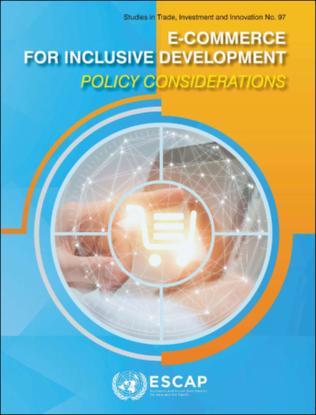E-Commerce for Inclusive Development: Policy Considerations
 DOWNLOAD (1.2 MB)
DOWNLOAD (1.2 MB)
Publication Type:
Publisher:
United Nations Economic and Social Commission for Asia and the Pacific (ESCAP)
Recognizing that “inclusive development” is a very broad term, this paper focuses on two of its dimensions: poverty reduction and empowering women.
It is often said that e-commerce holds immense promise in driving inclusive development. In the E-Commerce and Development Report 2002, Kofi A. Annan, then Secretary-General of the United Nations, urged the international community to prioritize the utilization of information and communication technology (ICT) to achieve the Millennium Development Goal of halving extreme poverty by 2015.
Two decades have transpired since then. How has e-commerce contributed to inclusive development? What are the lessons learned and what are the policy implications?
This paper aims to answer these questions. Recognizing that “inclusive development” is a very broad term, this paper focuses on two of its dimensions: poverty reduction and empowering women. Both dimensions are cornerstones of the Millennium Development Goals and the Sustainable Development Goals.
Contents
- Executive summary
- Introduction
- Key literature on the analytical framework
- Leverage e-commerce for poverty reduction
- Women’s economic empowerment through e-commerce
- Policy implications
- References


